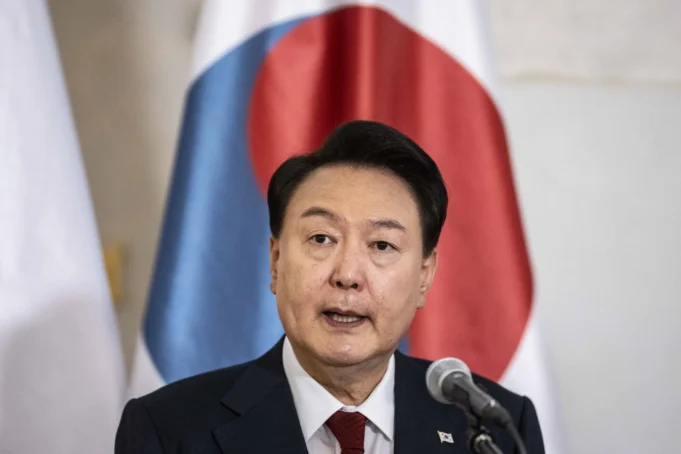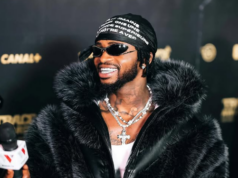Yoon Suk-Yeol (born December 18, 1960, Seoul, South Korea) is a South Korean lawyer and public official who served as prosecutor general (2019–21) and is now president (2022– ) of South Korea.
Family, early life, and education
Yoon was born in the Bomun-dong neighborhood of Seoul’s Seongbuk district to a pair of professors. His father, Yoon Ki-Jung, was a prominent economist at Yonsei University who cofounded the Korean Statistical Society and became a member of the National Academy of Sciences. His mother, Choi Jeong-Ja, lectured at Ewha Womans University before leaving the position to get married. The couple raised Yoon and his younger siblings in Gangnam district’s Yeonhui-dong, where Yoon attended Daegwang Elementary School, Jungnang Middle School, and Chungam High School.
Receiving a high-school diploma in 1979, Yoon originally wanted to study economics and become a professor, like his father, but the elder Yoon suggested that he study law instead. If Yoon still wanted to learn about economics after getting his degree, his father said, he could always get into economic law. Taking his father’s advice, Yoon matriculated at Seoul National University as a law major.
On May 8, 1980, Yoon took the role of judge in a mock trial of Chun Doo-Hwan, the army general who had staged a coup d’état against South Korea’s civilian government. He sentenced Chun to death. When the story spread throughout the school, Yoon fled to the home of a relative in Gangneung, where he remained in hiding for three months.
Yoon graduated from Seoul National University with an undergraduate degree (1983) and a master’s degree (1988) in law. He emerged from the university system still desiring to become a professor. Believing it necessary to pass South Korea’s bar exam in order to secure a position, he studied for the test—only to fail the second of its two sections eight times.
Yoon’s difficulty in passing the bar has been the cause of much speculation. Supporters noted that it was once common to fail anyone with a protest record who took the exam; Yoon’s mock trial might therefore have worked against him. Other sources have reported that Yoon was simply not a serious student, preferring socializing to studying. Regardless, he finally passed the bar exam, on his ninth attempt, in 1991.
Legal career and the impeachment of Park Geun-Hye
By then, however, his ambition had changed. Yoon enrolled in the Judicial Research & Training Institute, graduating in February 1994. Afterward he began his career as a prosecutor at the Daegu District Prosecutors’ Office. Yoon subsequently worked in Chuncheon (1996–97), Suwon (1997–99), Seoul (1999–2001), and Busan (2001–02). His most notable achievement during this period was his successful prosecution in 1999 of the National Police Agency’s intelligence chief, Park Hee-Won, on charges of bribery. In 2002 Yoon left government service to join the law firm Bae, Kim, & Lee. His time in private practice was short. Yoon found the work an ill fit and returned to the prosecutor’s life in February 2003, joining the Gwangju District Prosecutors’ Office. While there, in 2004, he won another high-profile case, obtaining a one-year jail sentence for political candidate Ahn Hee-Jung’s acceptance of illegal campaign donations. In 2005 he transferred to Uijeongbu.
In 2007 Yoon was promoted, becoming prosecution research officer for the Supreme Prosecutors’ Office (SPO) in Seoul. In that role he helped incarcerate Hyundai chairman Chung Mong-Koo for bribery and breach of fiduciary duty. He was also dispatched for two months by the SPO to investigate allegations against the country’s new president, Lee Myung-Bak. After his work on the Lee case, Yoon received another promotion in March 2008, this time becoming chief prosecutor of the Daejeon District Prosecutors’ Office’s Nonsan Branch. He served in that capacity until 2009, when he was moved to the special investigation department of the chief prosecutors’ office in Daegu district. That posting was swiftly followed by a return to the SPO later that year as a criminal intelligence officer. In 2010 the SPO made him a chief prosecutor.
Yoon remained in that office into 2013, during which time he married Kim Keon-Hee and further burnished his reputation by successfully prosecuting Lee Myung-Bak’s brother Lee Sang-Deuk. Yoon’s bright future seemed to dim when he fatefully accused his superiors of trying to influence his investigation into the National Intelligence Service’s alleged interference in the 2012 presidential election. Yoon was consequently exiled back to the provinces, where he spent the next four years working small cases. There he might have remained but for another major scandal that called for his experience and reputation as an incorruptible prosecutor: an illegal relationship between Pres. Park Geun-Hye and her shaman, Choi Soon-Sil. Recalled to Seoul in December 2016 to work alongside Special Counsel Park Young-Soo, Yoon helped to impeach and convict the president. The case made him a national symbol of justice, leading the next president, Moon Jae-In, to appoint Yoon the chief prosecutor of the Seoul Central District Prosecutors’ Office in 2017.
Conflicts with the Moon administration
On June 17, 2019, Yoon was nominated by Moon to be the SPO’s prosecutor general. Yoon was predictably opposed by former president Park’s conservative party, then called the Liberty Korea Party, and supported by Moon’s Democratic Party—an irony, considering what was to come. Not two months after Yoon’s term began, on July 25, his SPO launched an investigation into Cho Kuk, Moon’s new minister of justice. The inquiry led Cho to resign only 35 days after his term officially began, a major embarrassment for Moon’s government.
Thereafter, Moon’s administration and Yoon appeared to be in constant battle. The next minister of justice, Choo Mi-Ae, took action against high-ranking prosecutors in the SPO in January 2020. The SPO began a probe into potential election law violations by Moon’s ally, Ulsan mayor Song Cheol-Ho, the same month. Matters came to a head in late 2020, when Choo twice attempted to suspend Yoon from his position. Yoon successfully appealed both suspensions. With such animosity between the two, it might have seemed a relief to the government when Yoon offered his resignation on March 4, 2021. In fact, it was the beginning of a far greater struggle between the prosecutor and Moon’s party. On June 29 Yoon announced his intention to run for the presidency in the 2022 election, and on July 30 he joined the opposition party, rechristened the People Power Party (PPP).




